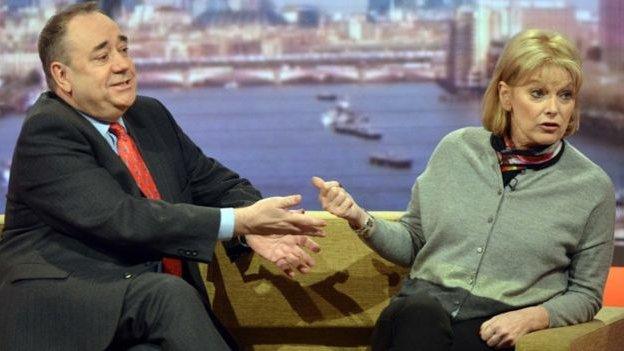Chaos averted: Conservative's surprising - and speedy - rout
- Published
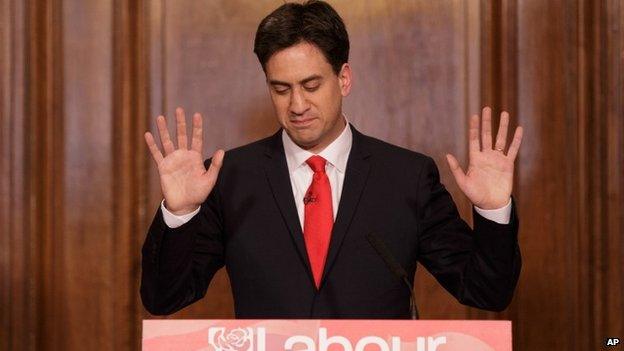
The thing about having your entire country in one time zone is it often doesn't take long for election celebrations to begin and hopes to be dashed.
In the US, even in contests that proved to be routs, the drip-drip of states closing their polls across the country offers a glimmer of hope for the soon-to-be defeated.
The Democrats will carry Massachusetts! South Carolina is going Republican! Such developments are never a surprise, but it gives partisan audiences a chance to cheer.
On Thursday night in the UK, however the drama faded almost instantly as the electoral verdict was issued seconds after voting ended at 22:00.
The Conservatives, exit polls showed, would easily be the largest party, and it wouldn't be close.
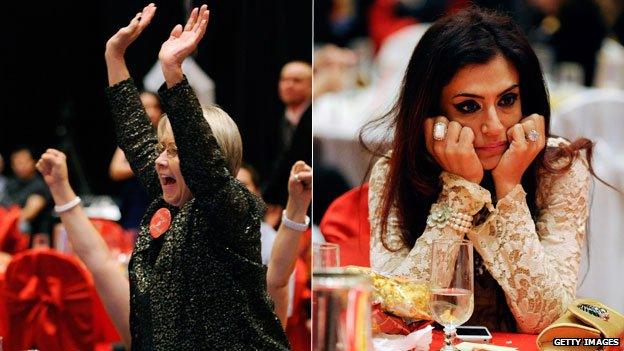
The up and downs of US election night 2012 for Mitt Romney supporters
The ensuing hours were filled with obligatory admonitions from shocked Labour and Liberal Democrat officials that everyone should wait for the votes to be counted.
But as constituency after constituency reported, with their quaint ceremony of having all candidates stand together on a cheap stage to hear the vote totals read aloud, the numbers told the same story.
In a way Thursday was a mirror image of the 2012 US presidential election.
Going into that vote, conservatives insisted that weeks of polls were not reflective of a late surge in support for Republican Mitt Romney, who they said had what then-President Richard Nixon called a "silent majority" behind him.
Democrats, on the other hand, placed their faith in the science of surveys, personified in the bespectacled visage of self-professed statistics nerd Nate Silver.
That vote ended with President Barack Obama breezing to re-election, and shocked Republicans left scratching their heads.
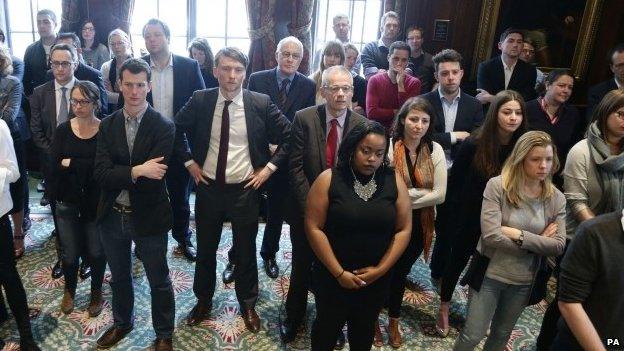
Labour aftermath: supporters listen to Ed Miliband resign
Here in the UK this week, however, it was the polls that were wrong, and even the seemingly infallible Silver - who took a break from US politics to dip his toe in the general election forecasting game - came away befuddled, external. The "silent majority" was real - in the person of the "shy Tory, external", a Conservative voter who only acknowledged his true allegiance when putting pen to paper ballot on voting day.
By the time all was said and done, Conservatives had outperformed even the exit polls, securing an outright majority in Parliament.
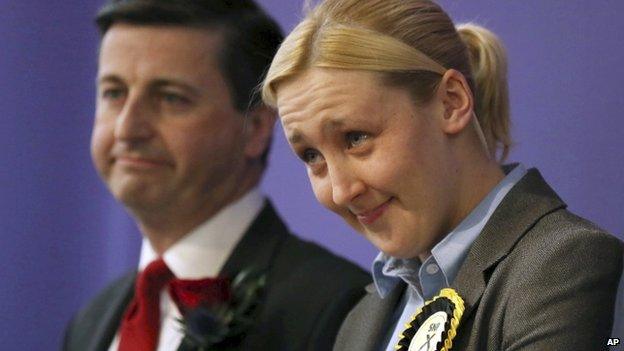
SNP's Mhairi Black (right) is now the youngest member of Parliament
Below the headlines of Conservative triumph, the two story lines we explored earlier this week - the rise of the Scottish National Party at the expense of Labour and the plight of Nick Clegg and the Liberal Democrats - proved to be determinative.
All across Scotland SNP candidates emerged victorious, beating Scottish Labour Party Leader Jim Murphy in one constituency and former Liberal Democrat leader Charles Kennedy in another. Labour shadow Foreign Secretary Danny Alexander was unseated in Glasgow by a 20-year-old university student, Mhairi Black.
"The Scottish lion has roared this morning across the country," said former SNP leader Alex Salmond, upon winning his race in north-east Scotland. "There is a swing underway in Scotland the like of which has not been seen in recorded politics."
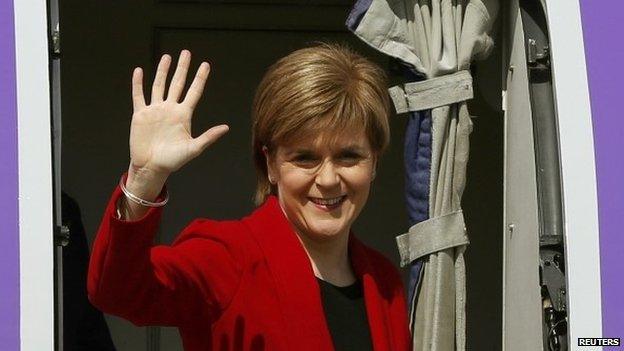
Nicola Sturgeon's Scotland National Party swept Scotland
Hyperbole aside, the numbers bear him out. SNP candidates won 56 of the 59 Scottish contests, a gain of 50 seats in Parliament. Last year Labour officials worried that Scottish independence would spell electoral ruin, as a key base of support broke away. Scotland may still be in the union, but Labour's fate appears to have been sealed nonetheless.
While the SNP swept the north, support for the Liberal Democrats collapsed across the UK.
Mr Clegg had been making a last-minute pitch in his cross-country tour for voters to turn to his party as a moderating, stabilising influence on British politics. Instead, it appears, former Lib Dem voters embraced the candidates of their Conservative Party coalition partners.
"When the polls close tomorrow night," Mr Clegg said on Wednesday, "we will be the surprise story of the election." And, in a way, he was right - just like the Titanic was the surprise story of trans-Atlantic travel in 1912.
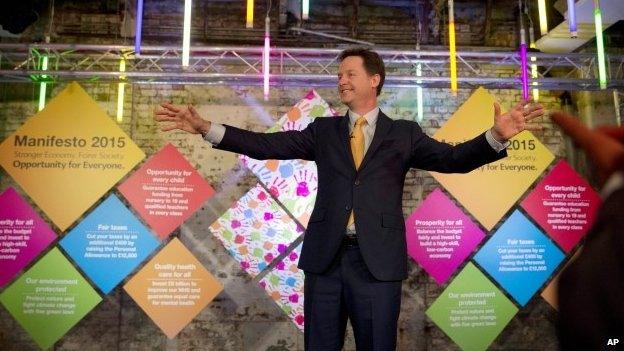
A surprise for sure - but not the one Mr Clegg wanted
Liberal Democrats went from a record high of 56 seats after the 2010 election to a projected total of 8 after Thursday's voting - a result "more crushing than ever feared", Mr Clegg said.
In the UK the political price of defeat comes shockingly - perhaps mercifully - quickly. Mr Clegg has resigned his leadership role. So has UK Independence Party leader Nigel Farage, who lost his bid for Parliament from Thanet South. Labour's Ed Miliband is gone as well.
Meanwhile, Mr Cameron emerges as a Conservative hero, having led his party to its first majority victory in a general election since 1992.
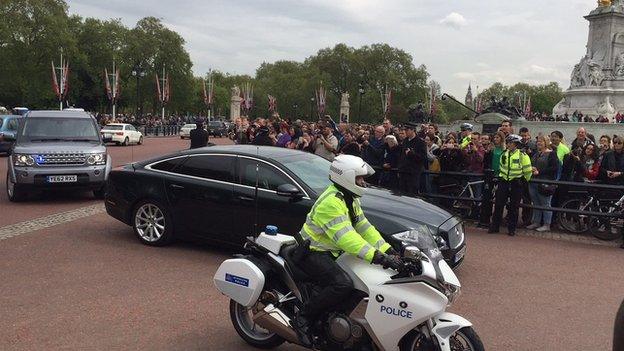
Prime Minister David Cameron on his way to Buckingham Palace
And so the 2015 general election ends the way it started, with Mr Cameron whisked from 10 Downing to Buckingham Palace for an audience with the queen.
Just over a month ago, the journey was filled with uncertainty. Parliament had been dissolved, and the outcome of the general election was in serious doubt. Could the Tories keep their tenuous hold on power?
Now Mr Cameron makes the trip in triumph. No coalitions, no fractured government. Just Conservative Party rule for the next five years.
- Published28 March 2015
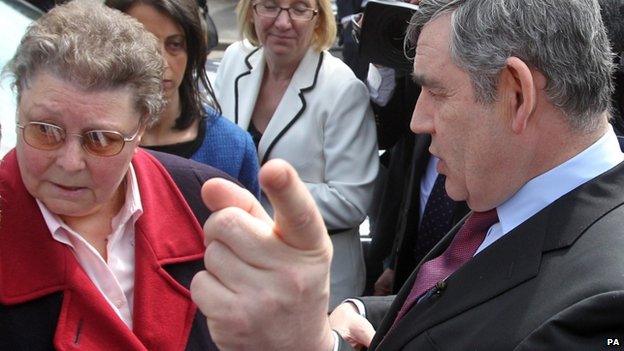
- Published19 March 2015

- Published28 March 2015
